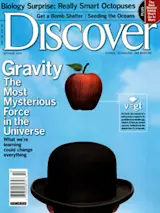For one week in October each year, the announcement of the Nobel Prizes lands arcane scientific concepts on the front pages of the papers and briefly imbues staid research labs with the carnival atmosphere of a Hollywood gala. On October 8, scientists at Rockefeller University in New York City got their turn in the spotlight, celebrating the crowning of Roderick MacKinnon, a professor of molecular neurobiology and biophysics, as a Nobel Prize winner in Chemistry for 2003. McKinnon responded by providing a personal perspective on what it means to win a Nobel. DISCOVER reporter Laura Wright was on the scene.
It is the wee morning hours of October 8, 2003, and Roderick MacKinnon lies asleep in his bed in his quiet summer house on Cape Cod. At around six o’clock, he wakes to his telephone ringing. It’s Wendell Chin, an assistant in his laboratory at Rockefeller University. “You’ve won the ...














